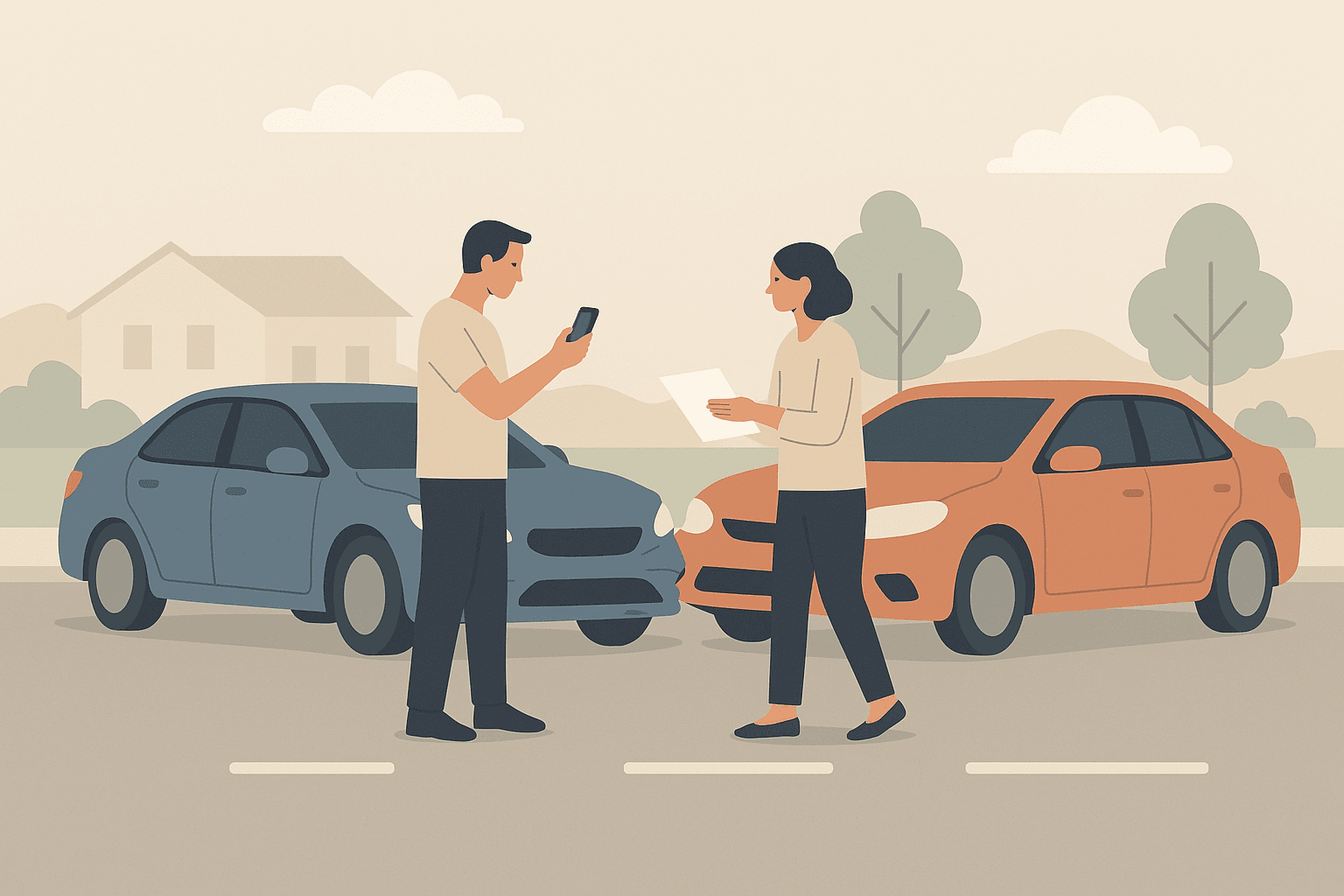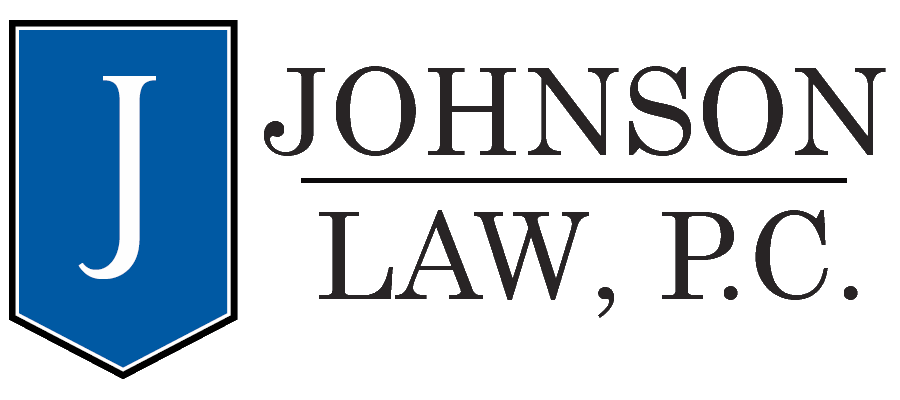What to Do Immediately After a Minor Car Accident
Even the most careful drivers can experience a minor car accident. Maybe it’s a gentle bump at a stop sign or a low-speed collision in a parking lot. While these incidents aren’t as severe as major crashes, knowing what steps to take in the moments following any accident can make a big difference. By understanding how to communicate, document, and follow up properly, you’ll be better equipped to handle the situation efficiently and protect your interests.
Table of Contents

A Real-World Example: A Parking Lot Fender-Bender
Scenario: You’re backing out of a parking spot and lightly tap another vehicle’s bumper. Both cars have minor scratches and no one is injured.
Immediate Steps:
- Move your car to a safe area out of the flow of traffic if possible.
- Check on the other driver to ensure they’re okay.
- Exchange contact and insurance information.
- Take photos of the damage and surrounding area.
- Contact your insurer to report the incident.
This scenario shows how prompt, calm action and thorough documentation can streamline the claims process and help resolve the situation quickly.
Minor vs. Major Accidents: Key Differences
Severity of Injuries and Damage:
- Minor Accidents:
Typically involve low-speed impacts and minimal damage—like a small dent or scratch on the bumper. Injuries, if any, tend to be minor and not immediately life-threatening. - Major Accidents:
Often occur at higher speeds or involve multiple vehicles. They can result in significant vehicle damage, deployment of airbags, and potentially serious injuries that require immediate medical attention.
Emergency Response:
- Minor Accidents:
You may not need emergency services if no one is hurt. A quick call to local law enforcement can suffice, especially if required by local regulations. - Major Accidents:
In the event of severe injuries or extensive damage, calling emergency services (police, EMTs, fire department) is essential. They help secure the scene, provide urgent medical care, and manage traffic.
Documentation and Reporting:
- Minor Accidents:
While documenting the scene with photos and exchanging information is still necessary, you might not always need a formal police report. That said, having one can speed up insurance claims. - Major Accidents:
Official documentation becomes more critical. Police reports, ambulance and hospital records, and detailed photographs of the scene and injuries will likely be required for insurance and potential legal actions.
Insurance Claims and Resolution:
- Minor Accidents:
Claims tend to be simpler and may resolve within weeks. Insurers often settle quickly, especially if it’s clear who is at fault and repairs are straightforward. Insurers like to settle these matters before worse injuries become apparent. - Major Accidents:
The claims process is generally more complex. Multiple parties, disputed fault, severe injuries, and higher repair costs can extend the timeline. Negotiations may involve attorneys, additional evidence, and possibly mediation or arbitration.
Legal Considerations:
- Minor Accidents:
Many major accidents are incorrectly identified as minor accidents. Lower potential financial compensation can dissuade some attorneys from taking your case. Some laws help attorneys handle minor cases by paying them from penalties imposed on insurance companies instead of a portion of their clients' settlements. - Major Accidents:
Due to higher stakes—severe injuries, extensive damages, and larger potential settlements—seeking professional legal advice may be more common to protect your rights and ensure fair compensation.
By understanding these distinctions, you’ll know when a more measured, routine approach is sufficient—such as in minor fender-benders—and when a more urgent and thorough response is necessary, as with serious collisions. This awareness helps ensure you take appropriate steps to protect your well-being, your legal rights, and your financial interests after any type of car accident.
Ensure Everyone’s Safety
- Check for Injuries:
First and foremost, make sure everyone involved is safe. Even if it’s a minor accident, some injuries (like whiplash) may not be immediately apparent. If anyone is hurt, call for medical assistance right away. - Move to a Safe Location:
If possible, move vehicles out of traffic to reduce the risk of secondary accidents.
Know Local Variations
- Legal Requirements:
Depending on where you live, you may need to report any accident—even a minor one—to local authorities, especially if there’s property damage above a certain amount. Some regions also have specific rules on what information must be exchanged or how soon you must notify the police. - Check Your State or Country’s Regulations:
Familiarize yourself with your local laws to ensure full compliance.
Contact Authorities (If Necessary)
- Police Reports Help:
Even in minor accidents, having a police report can speed up the claims process. If law enforcement is available and willing to file a report, consider requesting one. - Timeframes and Expectations:
In some areas, officers may only respond to non-injury accidents if they’re blocking traffic or if damage is substantial. If no officer arrives, you may need to file a report at a station or online.
Exchange Information and Document Thoroughly
- What to Gather:
Exchange names, contact details, insurance information, driver’s license numbers, and vehicle descriptions. - Take Photos and Notes:
Document damage to all vehicles, license plates, weather conditions, and the exact location. - Timeframes & Expectations:
Completing these steps promptly—ideally on the scene—helps ensure accuracy and credibility if you file a claim. Most insurers recommend notifying them as soon as possible, which could be within 24 hours to a few days depending on your policy.
Insurance Rate Implications and Follow-Up
- Reporting the Accident:
Even a minor incident might affect your premiums. Some insurance policies offer accident forgiveness, while others may increase your rate after filing a claim. - Review Your Policy:
If you’re unsure about how this incident could influence your rates, review your policy terms or contact your insurer’s customer service. - Future Coverage Decisions:
Understanding rate implications may also guide you in deciding whether to pay for minor damages out-of-pocket or file a claim.
Contacting Your Insurance Company
- Prompt Communication:
Reach out to your insurer to report the accident, provide the other driver’s details, and share any photos or documentation you have. - Adjusters’ Role:
Your insurance company may assign a claims adjuster to investigate the incident. This professional may ask you for additional details or arrange for an inspection of the vehicle.
Appeals, Arbitration, and Disputes
- If You Disagree with the Outcome:
If a dispute arises—perhaps you feel the insurer’s settlement offer is too low—you have options. You can request a review or consider arbitration if both parties agree. - Professional Guidance:
Consulting a personal injury attorney might be helpful if negotiations stall or you feel your rights are not being upheld.
Communication Tips: Working with Adjusters and Other Parties
- Be Clear and Factual:
Provide straightforward, honest information. Stick to the facts and avoid speculation about fault. - Stay Organized:
Keep a log of all phone calls and emails. Have your policy number, claim number, and photos easily accessible. - Maintain a Polite, Cooperative Tone:
Courtesy can foster more productive relationships, making it easier to settle claims fairly and quickly.
Avoiding Common Pitfalls
- Don’t Admit Fault on the Scene:
It may feel natural to apologize, but such statements can be interpreted as admitting responsibility. Let insurance adjusters and authorities determine fault based on the evidence. - Don’t Neglect Documentation:
Proper records ensure a smoother claims process. Without them, you might struggle to prove who caused the damage or establish the extent of the loss.
Key Takeaways
- Safety First: Secure the area and check for injuries before doing anything else.
- Know Your Local Rules: Requirements vary, so understanding local laws can save time and trouble.
- Document Everything: Photos, witness statements, and prompt reporting strengthen your case.
- Communicate Effectively: Respectful, organized communication with insurers and adjusters can simplify claim resolution.
- Be Informed About Insurance Implications: Understand how a claim might affect your premiums and what to do if you disagree with the insurer’s decision.
Additional Resources
- A Beginner’s Guide to Understanding Car Insurance Claims
- The Ultimate Guide to Traffic Lights, Road Safety, and Smarter Driving
By understanding these distinctions, you’ll know when a more measured, routine approach is sufficient—such as in minor fender-benders—and when a more urgent and thorough response is necessary, as with serious collisions. This awareness helps ensure you take appropriate steps to protect your well-being, your legal rights, and your financial interests after any type of car accident.
We will review your case for free.
Pay us nothing unless we get you a better settlement.
We work on contingency.

